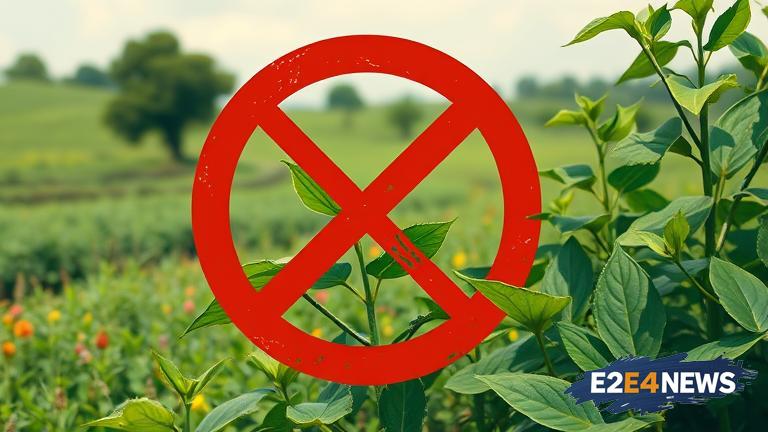The use of synthetic pesticides has been a topic of controversy in recent years, with some advocating for their complete elimination. However, a new report suggests that cutting out synthetic pesticides altogether could have severe consequences for global food production and the environment. The report argues that synthetic pesticides play a crucial role in maintaining high crop yields and preventing the spread of pests and diseases. Without these chemicals, farmers may struggle to produce enough food to meet the world’s growing demand. This could lead to food shortages, price increases, and decreased food security, particularly in developing countries. Furthermore, the report suggests that alternative methods of pest control, such as organic farming, may not be as effective or efficient as synthetic pesticides. Organic farming often requires more land, water, and labor to produce the same amount of food, which could lead to increased greenhouse gas emissions and deforestation. Additionally, the report highlights the potential environmental impacts of abandoning synthetic pesticides. For example, the use of natural pesticides, such as pyrethrin, can be toxic to beneficial insects and other non-target species. The report also notes that the development of new, more targeted pesticides is being hindered by the increasing regulatory burden and public opposition to synthetic pesticides. This could limit the availability of effective pest control tools for farmers, making it even more challenging to produce food sustainably. The report’s authors argue that a more balanced approach is needed, one that takes into account the benefits and risks of synthetic pesticides and seeks to minimize their environmental impact while maintaining their effectiveness. This could involve the development of more targeted and sustainable pesticides, as well as the implementation of integrated pest management strategies that combine multiple approaches to minimize harm to the environment. The report’s findings have significant implications for policymakers, farmers, and consumers, highlighting the need for a more nuanced and informed debate about the use of synthetic pesticides in agriculture. As the global population continues to grow, it is essential that we find ways to produce food sustainably and efficiently, while minimizing harm to the environment. The report’s authors conclude that abandoning synthetic pesticides altogether is not a viable solution and that a more balanced approach is needed to ensure global food security and environmental sustainability. The use of synthetic pesticides is a complex issue, and the report’s findings highlight the need for further research and discussion. The report’s authors suggest that a more collaborative approach is needed, one that brings together farmers, policymakers, and environmentalists to find solutions that balance the need for food production with the need to protect the environment. This could involve the development of new technologies and strategies that minimize the environmental impact of synthetic pesticides, as well as the implementation of policies that support sustainable agriculture. The report’s findings have significant implications for the future of food production and the environment, highlighting the need for a more informed and nuanced debate about the use of synthetic pesticides. As the world’s population continues to grow, it is essential that we find ways to produce food sustainably and efficiently, while minimizing harm to the environment. The report’s authors argue that this will require a more balanced approach, one that takes into account the benefits and risks of synthetic pesticides and seeks to minimize their environmental impact while maintaining their effectiveness. The use of synthetic pesticides is a critical issue, and the report’s findings highlight the need for further research and discussion. The report’s authors suggest that a more collaborative approach is needed, one that brings together farmers, policymakers, and environmentalists to find solutions that balance the need for food production with the need to protect the environment. The report’s findings have significant implications for global food security and environmental sustainability, highlighting the need for a more informed and nuanced debate about the use of synthetic pesticides. The report’s authors conclude that abandoning synthetic pesticides altogether is not a viable solution and that a more balanced approach is needed to ensure global food security and environmental sustainability. The report’s findings highlight the need for further research and discussion, as well as the need for a more collaborative approach to finding solutions that balance the need for food production with the need to protect the environment. The use of synthetic pesticides is a complex issue, and the report’s findings highlight the need for a more nuanced and informed debate about their use in agriculture. The report’s authors argue that a more balanced approach is needed, one that takes into account the benefits and risks of synthetic pesticides and seeks to minimize their environmental impact while maintaining their effectiveness. The report’s findings have significant implications for policymakers, farmers, and consumers, highlighting the need for a more informed and nuanced debate about the use of synthetic pesticides. The report’s authors suggest that a more collaborative approach is needed, one that brings together farmers, policymakers, and environmentalists to find solutions that balance the need for food production with the need to protect the environment. The report’s findings highlight the need for further research and discussion, as well as the need for a more informed and nuanced debate about the use of synthetic pesticides in agriculture.





